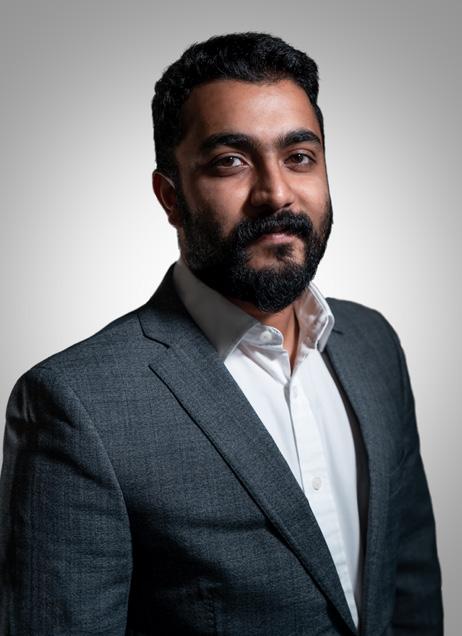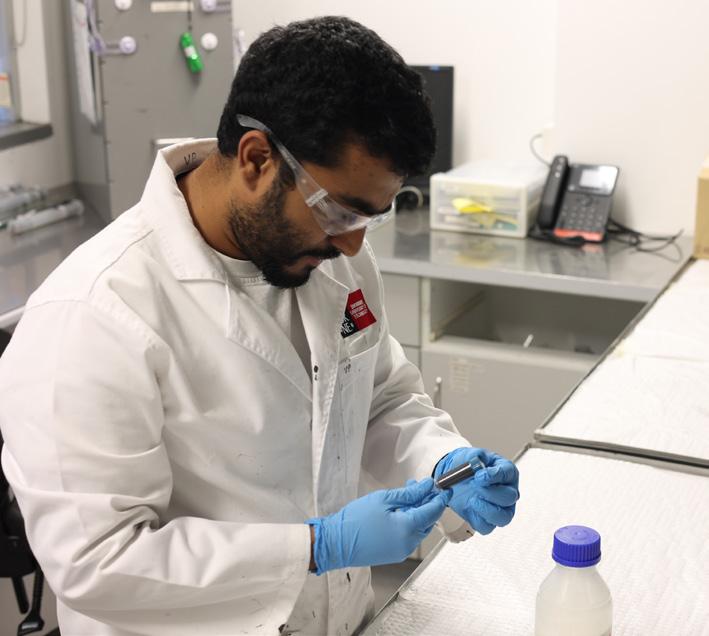
6 minute read
CMatP Profile: Vishnu Vijayan Pillai
Where do you work and describe your job?
I am Vishnu Vijayan Pillai, a material science and engineering researcher with a master’s degree in Nanotechnology. Previously, I worked as a Research Engineer at Khalifa University, where I gained valuable experience in the field of advanced materials and their applications. After receiving the prestigious Australian Global Talent Visa, I relocated to Australia, embarking on a new phase of my career where I was awarded a Ph.D. scholarship from the Australian Research Council. This scholarship enabled me to pursue research at Swinburne University of Technology under the esteemed guidance of Dr. Nishar Hameed, Dr. Nisa Salim, and Dr. Peter Kingshott.
My Ph.D. research focuses on developing advanced graphene formulations for sensing intelligence in real-time Structural Health Monitoring (SHM) applications. Graphene’s exceptional properties make it a promising material for SHM, particularly in aerospace, defense, automotive, infrastructure, and renewable energy sectors. Additionally, I received a top-up scholarship from the Australian Defence Science Institute's RHD Grant program.
Apart from my research work, I am also the co-founder of Manhat, a deep technology startup based in the United Arab Emirates and Australia. Manhat focuses on developing and deploying its patented 'natural water distillation' technology to provide sustainable water solutions for irrigation in inland and floating farms. Along with my former research supervisor, Dr. Saeed Alhassan, we aim to address water scarcity challenges by offering a solution that ensures clean water production without brine rejection. Our technology has attracted international recognition and accolades, making Manhat a promising player in the water sustainability sector.
What inspired you to choose a career in materials science and engineering?
My journey into the field of materials science and engineering was not entirely driven by inspiration at first. Rather, it was a conscious choice made during my early academic years. After completing my grade 12, a friend’s father introduced me to the field of nanotechnology. Intrigued by the possibilities it offered, I pursued an integrated master’s degree in Nanotechnology from Amity University, India.
It was during my research internships that my interest in materials engineering truly developed. The internships I undertook at Cochin University of Science and Technology (India), the Nanotechnology and Integrated Bioengineering Centre at Ulster University (UK), and my master’s thesis at the University of Montpellier (France) broadened my understanding of materials science and engineering. These experiences allowed me to explore the fascinating world of materials at the nanoscale and how innovative solutions could be developed to address practical challenges. It was this exposure to advanced research environments and diverse applications that ignited my passion for the field.
Who or what has influenced you most professionally?
Throughout my research journey, which spans over a decade, I have encountered numerous exceptional professionals who have left a lasting impact on my career. I cannot attribute my growth and progress to a single individual but rather to a collective of inspiring mentors, colleagues, and seniors who have guided me along the way. The transition from academia to the startup ecosystem has been transformative. Seeing how technology can directly impact society has inspired me to drive research toward innovation. Co-founding Manhat has broadened my perspective on how research and technology can be translated into practical solutions to address pressing global issues like water scarcity.
What does being a CMatP mean to you?
It holds significant meaning for me as it represents both recognition and opportunity within the field of materials science and engineering. Achieving CMatP status is not only a testament to my qualifications and expertise but also a mark of credibility that signifies my commitment to maintaining the highest standards of professionalism and innovation in this dynamic field. CMatP offers an incredible platform to deepen my understanding of the materials ecosystem in Australia and beyond. It provides access to a vibrant network of professionals who are at the forefront of materials application and technology. This endorsement adds weight to my credentials, enhancing my visibility within the broader scientific and industrial community.
What gives you the most satisfaction at work?
The sense of accomplishment I feel when I successfully achieve or even exceed my goals is incredibly rewarding. It validates the time, energy, and dedication I've invested. Moreover, the journey of overcoming challenges along the way and finding innovative solutions to push the boundaries of what's possible adds even more meaning to the achievement.
What is the best piece of advice you have ever received?
The best piece of advice I've ever received came from my father: "Follow your passion. Never underestimate yourself." These words echo in my mind whenever I'm feeling stressed, and they always fuel me with energy. My father has an incredible calmness about him. Even during his battle with cancer, when I was by his side throughout his treatment, he remained calm and took everything in stride. His resilience and unwavering positivity continue to inspire me.
What are you optimistic about?
I am optimistic about the potential of deep technology to address some of the most pressing global challenges. I believe that breakthroughs in materials science and engineering can significantly improve the quality of life for millions of people. I am confident that our continued research and development efforts will lead to impactful innovations that promote sustainability and resilience.
What have been your greatest professional and personal achievements?
With over eight years of research experience, I have had the privilege of working across leading institutions in India, the UK, France, the UAE, and Australia. My specialization in advanced materials has resulted in the publication of numerous journal articles and presentations at prominent international conferences, including ACS Boston.
Some of my most notable accomplishments include receiving the Australian Global Talent Visa and the UAE Golden Visa, which recognize my contributions to the field. As the co-founder of Manhat, I played a key role in securing international recognition and exposure through events such as Expo Dubai (2020), the World Future Energy Summit (2022), and the United Nations COP28 (2024). Manhat has been awarded the European Union Water Europe Innovation Award (2022), the Future 100 Award (2023 & 2024), and the Best Practices Award at Expo 2025 Osaka, Kansai, Japan. Additionally, I was awarded the Halcyon Climate Fellowship in 2024, which reinforced my commitment to sustainability.
My PhD research was selected to present at the prestigious European Materials Research Society (E-MRS) Spring Meeting, held in Strasbourg, France in May 2025.
This opportunity allowed me to share my research on smart coatings for sensing intelligence with an international audience of researchers and experts in the field
On a personal level, I consider my greatest achievement to be my role as a parent to two amazing boys, Dhruv and Daksh, alongside my supportive wife, Remya, who has been a constant pillar of strength throughout my journey.
Which has been the most challenging job/project you’ve worked on to date and why?
Every project I have undertaken presents its own set of challenges. However, there are a few specific experiences that stand out due to their complexity and the learning curve involved. Firstly, transitioning from a research background to the startup ecosystem was a significant challenge. When I co-founded Manhat, I had little to no business background and was initially unsure of how to navigate the entrepreneurial landscape. However, through persistence, guidance from mentors, and continuous learning, I gradually adapted and succeeded in meeting our objectives. Leading a deep technology startup requires balancing research and commercialization, which remains a challenging but rewarding endeavor. Secondly, returning to academia to pursue a Ph.D. after working in the industry for several years presented challenges on both personal and professional levels. Adjusting to the rigorous demands of academic research, while reorienting my mindset from industry-driven objectives to long-term scientific exploration, was no small feat. On a personal level, balancing family responsibilities and maintaining a healthy work-life equilibrium added another layer of complexity. Despite these difficulties, my passion for research and the pursuit of knowledge has continued to propel me forward.

What are the top three things on your bucket list?
As someone who enjoys traveling, my bucket list includes experiences that are meaningful and personal. The first and most cherished item on my list is visiting Japan to witness the breathtaking beauty of Mount Fuji. This has been a longstanding dream of mine, and I look forward to embracing a peaceful moment surrounded by its serene landscape. Secondly, I wish to travel to New Delhi with my mother to visit Amity University, where I completed my Master’s in Nanotechnology. Due to various reasons, my mother was unable to visit my university during my academic years. Taking her to see the place where I spent a significant part of my academic journey would be a moment of pride and fulfillment. Lastly, there is a third goal that I wish to keep close to my heart for now. It is a goal that holds profound personal and professional significance for me—something that resonates deeply with my aspirations and values. While I prefer to keep it under wraps for the time being, it is a vision I am passionately working toward, and I hope to see it come to fruition in the near future.




